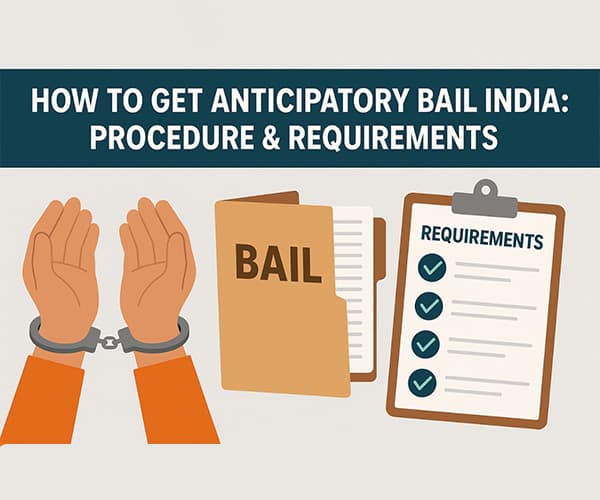How to Get Anticipatory Bail in India: Procedure & Requirements

Being accused of a serious offence can be terrifying, especially if there’s a risk of arrest. In such cases, anticipatory bail in India offers legal protection. But how do you apply, what are the requirements, and which court should you approach? This complete guide by Vakeel Saab explains the anticipatory bail procedure in India step by step.
Anticipatory bail is a legal remedy available under Section 438 of the Code of Criminal Procedure (CrPC). It allows a person to seek bail in anticipation of arrest for a non-bailable offence. This blog covers how to get anticipatory bail, the legal requirements, procedure, common grounds for rejection, and why consulting Criminal Lawyers in Delhiand across India is essential for success. With Vakeel Saab’s online criminal lawyer consultation, you can prepare effectively and safeguard your rights.
What is Anticipatory Bail?
Anticipatory bail is an order by the court that ensures a person cannot be arrested once accused of a non-bailable offence. It is different from regular bail, which is sought after arrest. This provision was introduced to protect individuals from false or motivated criminal charges.
- Provision: Section 438 CrPC
- Applicability: Only for non-bailable offences
- Relief: Protection from arrest before or after FIR is filed
Anticipatory Bail Requirements in India
Before applying, certain requirements must be met:
- The offence must be non-bailable.
- Applicant must show apprehension of arrest.
- No prior conviction for similar offences.
- Application must include grounds for seeking protection.
Anticipatory Bail Procedure in India
Here’s the step-by-step process explained by Vakeel Saab’s Criminal Lawyers in India:
- Hire a Criminal Lawyer: Seek professional guidance to draft your application.
- File Application: Submit an anticipatory bail application format under Section 438 CrPC in the Sessions Court or High Court.
- Notice to Public Prosecutor: Court issues notice to the state/public prosecutor to hear objections.
- Hearing: Both sides present arguments. The court considers the seriousness of offence, applicant’s background, and reasons for apprehension of arrest.
- Court Order: If satisfied, the court grants anticipatory bail with conditions such as regular cooperation with police.
When Can Anticipatory Bail Be Sought?
- After FIR: When a First Information Report is filed against you.
- Before FIR: If there is a genuine apprehension of being named in a case.
- For 498A/Dowry Cases: Anticipatory bail is commonly sought in matrimonial disputes.
- In Supreme Court or High Court: If rejected at lower courts, applicants can approach higher judiciary.
Anticipatory Bail Rejection Reasons
Certain factors may lead to denial:
- Accused is a habitual offender or has criminal history.
- Offence involves grave charges such as murder, rape, terrorism.
- Applicant may tamper with evidence or influence witnesses.
- Lack of genuine grounds for apprehension of arrest.
Anticipatory Bail vs Regular Bail in India
Aspect
Anticipatory Bail
Regular Bail
Stage
Sought before arrest
Sought after arrest
Provision
Section 438 CrPC
Section 437/439 CrPC
Objective
Protection from arrest
Release from custody
Why Consult Criminal Lawyers for Anticipatory Bail?
Though you can technically draft an application yourself, anticipatory bail involves complex arguments and legal strategy. Engaging Criminal Lawyers in Delhi and other cities through Vakeel Saab ensures:
- Proper drafting of anticipatory bail application format.
- Presentation of strong legal grounds and evidence.
- Representation before Sessions Court, High Court, or Supreme Court.
- Guidance on conditions imposed by courts after bail is granted.
Frequently Asked Questions (FAQ)
What is anticipatory bail under CrPC 438?
It is a legal provision allowing a person to seek protection from arrest in non-bailable offences.
Can I get anticipatory bail after FIR is filed?
Yes, anticipatory bail can be sought both before and after an FIR is filed if there is a genuine fear of arrest.
Is anticipatory bail available in 498A dowry cases?
Yes, anticipatory bail is frequently granted in dowry and matrimonial dispute cases if genuine grounds are shown.
What if my anticipatory bail is rejected?
You can reapply in a higher court, including the High Court of India or the Supreme Court of India.
How is anticipatory bail different from regular bail?
Anticipatory bail protects you from arrest, while regular bail is sought after you are arrested.
If you are facing the risk of arrest in a criminal matter, don’t wait until it’s too late. Vakeel Saab connects you with top Criminal Lawyers in India who specialize in bail matters. Whether you’re in Delhi or anywhere across the country, our criminal lawyer online consultation service ensures expert legal help at your fingertips. Book your consultation today to secure your rights and prevent wrongful arrest.
Related Articles
The Importance of Consulting a Property Lawyer for Real Estate Issues
Blog
How to File a POCSO Complaint in India: Step-by-Step Legal Process
Blog
What punishments does the law give for giving, taking, or asking for dowry?
Blog
Reasons for the Increasing Divorce Rates in India
Blog
What is a Special Leave Petition? Meaning, Features, Process & & Who Can File?
Blog
What Is the Difference Between Mutual Divorce and Contested Divorce?
Blog